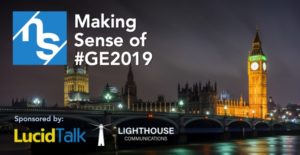The upcoming general election seems to be asking questions of both nationalism and unionism. Moderates or the so-called ‘extremes’: John Coulter asks who the big winners might be when the votes are counted. You can follow John on Twitter @JohnAHCoulter.
Will Sinn Féin hold its own?
Nationalism has steadily advanced in Northern Ireland since the February 1974 General Election when it only claimed one Westminster seat out of then 12. Now the political ‘greening’ of the North can account for seven of 18 seats – all of them now the dark green of abstentionist Sinn Féin.
In spite of the potential negative impact the Brexit debate has had on Ireland, north and south, the Remain/Leave argument has thrown nationalism a new political lifeline – choice!
Since the early 1980s, the battle for the heart and soul of nationalism in Northern Ireland has been a two-horse race between the moderate SDLP and the overtly republican Sinn Féin.
In 2017, Sinn Féin managed to wipe the SDLP off the face of the Westminster map in then Prime Minister Theresa May’s snap poll, eating substantially into the SDLP’s middle-class Catholic voter base while keeping a firm grip on its own working-class republican heartlands. A potentially resurgent SDLP could take at least two of the three seats it lost to Sinn Féin back then. As Michelle O’Neill will have realised from the result of Sinn Féin’s recent vice presidential contest, in which her competitor John O’Dowd hardly campaigned yet won 33% of the vote, success cannot be taken for granted.
What role could a re-emerged SDLP play a Westminster, and what will this mean for the debate within nationalism? Likewise, what impact will the appearance of the pro-life republican party Aontú, formed by ex-Sinn Féin TD Peader Tóibín, have on the seven constituencies in which it’s fielding candidates – five of them currently held by Sinn Féin? Given Sinn Féin’s brand of socialism continues to be challenged by the hard-left People Before Profit in Foyle and West Belfast, might this election see its long-standing abstentionist policy come under pressure?
What about unionism?
Just like in nationalism, this election has raised questions of unionism. Talk of electoral pacts has prompted unionism to agree their own understandings, in North Belfast and Fermanagh/South Tyrone. But what message will be sent to unionism if even with agreed candidates it still can’t hold North Belfast or win back Fermanagh & South Tyrone?
New UUP leader Steve Aiken has firmly positioned the party on unionism’s liberal wing. What will be the future for the UUP if this strategy fails to deliver a single MP? Having lost its MEP seat in May – a role it had held for 40 years – and witnessed around 40,000 votes disappear in a single month between the council and European elections, another electoral drubbing on 12 December will only herald the demands for a single unionist party.
The DUP should not be cock-a-hoop at this prospect for the UUP. What happens if grassroots loyalist opinion turns into political moves against the DUP in the future, incensed by the perceived betrayal of Boris Johnson’s Withdrawal Agreement?
Is the wider political landscape changing?
One of the biggest questions which should focus the minds of nationalism and unionism respectively during and after this election is the growing number of people in Northern Ireland who identify as ‘neither’ – according to the recent LucidTalk polls, roughly half of the electorate currently do so. The impact of this is already being seen – in May’s European election, Naomi Long’s Alliance Party deprived Sinn Féin of a first-place finish at the polls and convincingly took the UUP’s MEP seat. As has been pointed out by Lisa Whitten already on Northern Slant, should these trends from the opinion polls continue, this will be transformative.

